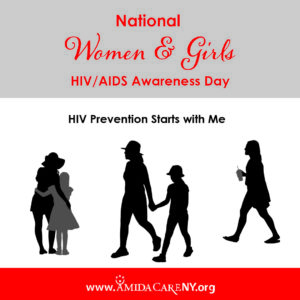National Women and Girls HIV/AIDS Awareness Day: Barriers Still Exist for Many

Thanks to the hard work of health care providers and community advocates, ending the HIV/AIDS epidemic is within reach. However, women–particularly women of color and transgender women—continue to be heavily impacted by the epidemic and experience significant health disparities. March 10th is National Women and Girls HIV/AIDS Awareness Day, a time to focus on and increase outreach and education around HIV testing, treatment, and prevention for women.
The Centers for Disease Control and Prevention (CDC) statistics for transgender and African-American women are dismal, and more must be done to reach these communities. In 2016, more than 7,000 women were diagnosed with HIV, according to the CDC, with a disproportionate 60% represented by African-American women. Transgender women are 49 times more likely to be living with HIV than the general population, and the CDC estimates that 25% of transgender women have been diagnosed with HIV in the U.S.
Among women in New York City newly diagnosed with HIV, over 90% were black or Latina. Black transgender women have the highest rates of HIV and are three times more likely to be living with HIV than white or Latina women.
Since the vast majority of diagnoses among women are attributed to sexual transmission, it is crucial that women in all communities have access to pre-exposure prophylaxis (PrEP), which dramatically decreases the risk of contracting HIV from sexual partners.
PrEP is more than 90% effective in preventing HIV transmission. Yet, a recent survey by the NYC Department of Health and Mental Hygiene showed that only 13% of women were aware of PrEP, a clear indication that more community outreach is needed. In New York State, the largest population of Medicaid recipients taking PrEP (37%) is white men.
Various factors contribute to this disparity in PrEP uptake. Early sexual abuse, trauma, and the fact that women are significantly more likely to be the primary caregiver for their families are just some of the reasons why it can be difficult for women to prioritize health care. Transgender women, who do not always get the support they need from medical professionals, are especially vulnerable. Additionally, discrimination and stigma are significant factors that deter women and girls from learning that they should get tested, seeking more information on prevention and treatment options, and disclosing their HIV status.
Let’s work to promote educational programs, enhanced sexual health services, and more resources to help women and girls take control of their sexual, reproductive, and overall health and wellbeing.
Resources:
A comprehensive overview on women and HIV
Tips from the U.S. Dept. of Health and Human Services’ Office on Women’s Health:
What Every Woman Needs to Know About HIV and AIDS
What Every Girl Needs to Know About HIV and AIDS
Amida Care is a Medicaid Special Needs Health Plan for people living with and at higher risk for HIV and currently serves 7,000+ members throughout the five boroughs of New York City. Confidential answers are available at 1-855-GO-AMIDA (1-855-462-6432) (TTY 711). Read our blog posts about HIV testing, HIV prevention resources, and accessing HIV treatment.
